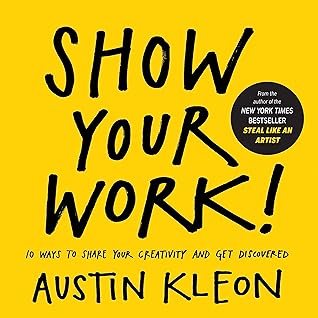More on this book
Community
Kindle Notes & Highlights
by
Austin Kleon
Read between
January 16 - January 28, 2025
I call these people human spam. They’re everywhere, and they exist in every profession. They don’t want to pay their dues, they want their piece right here, right now.
These artists hang out online and answer questions. They ask for reading recommendations. They chat with fans about the stuff they love.
If you want fans, you have to be a fan first. If you want to be accepted by a community, you have to first be a good citizen of that community.
But who you know is largely dependent on who you are and what you do, and the people you know can’t do anything for you if you’re not doing good work.
The Vampire Test works on many things in our lives, not just people—you can apply it to jobs, hobbies, places, etc.
The more people come across your work, the more criticism you’ll face.
The trouble with imaginative people is that we’re good at picturing the worst that could happen to us.
The more criticism you take, the more you realize it can’t hurt you.
You can’t control what sort of criticism you receive, but you can control how you react to it.
“Compulsive avoidance of embarrassment is a form of suicide.” If you spend your life avoiding vulnerability, you and your work will never truly connect with other people.
Because, of course, the worst troll is the one that lives in your head. It’s the voice that tells you you’re not good enough, that you suck, and that you’ll never amount to anything.
Don’t write off your friends because they’ve had a little bit of success.
The easiest way to do this is to simply ask for donations: Put a little virtual tip jar or a donate now button on your website. These links do well with a little bit of human copy, such as “Like this? Buy me a coffee.”
It’s important to note that these platforms work best when you’ve already gathered a group of people who are into what you do.
Beware of selling the things that you love: When people are asked to get out their wallets, you find out how much they really value what you do.
asking for money in return for your work is a leap you want to take only when you feel confident that you’re putting work out into the world that you think is truly worth something.
I know people who run multimillion-dollar businesses off of their mailing lists. The model is very simple: They give away great stuff on their sites, they collect emails, and then when they have something remarkable to share or sell, they send an email. You’d be amazed at how well the model works.
Yet a life of creativity is all about change—moving forward, taking chances, exploring new frontiers.
Yes. If an opportunity comes along that would mean more money, but less of the kind of work you want to do, say No.
The way I get over my guilt about not answering email is to hold office hours.
You just have to be as generous as you can, but selfish enough to get your work done.
“Above all, recognize that if you have had success, you have also had luck—and with luck comes obligation. You owe a debt, and not just to your gods. You owe a debt to the unlucky.”
The people who get what they’re after are very often the ones who just stick around long enough. It’s very important not to quit prematurely.
If you look to artists who’ve managed to achieve lifelong careers, you detect the same pattern: They all have been able to persevere, regardless of success or failure.
Author Ernest Hemingway would stop in the middle of a sentence at the end of his day’s work so he knew where to start in the morning.
Singer/songwriter Joni Mitchell says that whatever she feels is the weak link in her last project gives her inspiration for the next.
And the reality is that most of us just don’t have the flexibility in our lives to be able to walk away from our work for a full year. Thankfully, we can all take practical sabbaticals—daily, weekly, or monthly breaks where we walk away from our work completely.
“If you never go to work, you never get to leave work.”
“Whenever Picasso learned how to do something, he abandoned it.”
You can’t be content with mastery; you have to push yourself to become a student again. “Anyone who isn’t embarrassed of who they were last year probably isn’t learning enough,” writes author Alain de Botton.
When you get rid of old material, you push yourself further and come up with something better. When you throw out old work, what you’re really doing is making room for new work.
You have to have the courage to get rid of work and rethink things completely.


